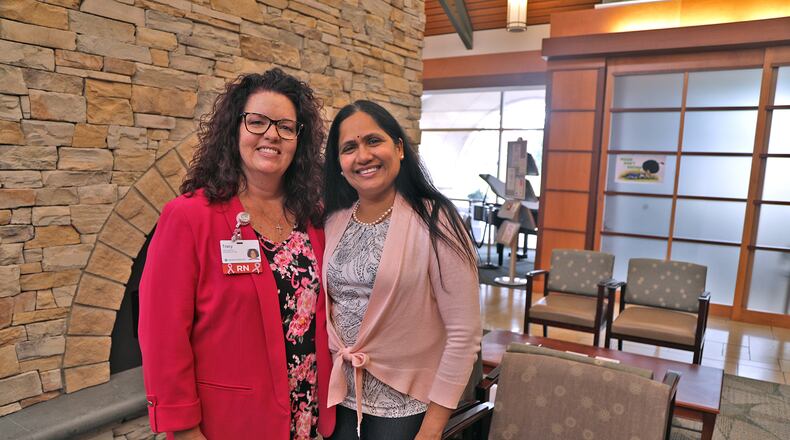Surgery is recommended for most, if not all, early stage breast cancer diagnoses, but doctors are also looking at the genetic makeup of the cancer cells to use other targeted treatments, including hormone and chemotherapy, to slow the growth of and kill cancer cells.
“The treatment choice is based on the grade of the tumor, the stage of the tumor, and the molecular subtype of the cancer,” Dr. Jyothi Challa, an oncologist with Mercy Health Springfield Regional Cancer Center, said.
For estrogen or progesterone positive cancers, treatments include hormone therapy, also called endocrine therapy, which can block or alter hormones to slow or stop the growth of the cancer cells. There are also targeted therapy drugs to shut down the HER2 protein in order to slow growth of and kill cancer cells.
The types of cancer are also divided into different molecular subtypes to help guide treatment options.
A particularly difficult type is called triple negative breast cancer. Triple negative breast cancer impacts approximately 15-20% of breast cancer patients, particularly among younger patients.
While doctors do not currently have targeted treatments for triple negative breast cancer tumors, immunotherapy and neoadjuvant chemotherapy are emerging as options to treat triple negative breast cancer, according to Dr. Roxane Weighall, surgical oncologist at Kettering Cancer Care. Immunotherapy stimulates the immune system, and neoadjuvant chemotherapy takes place before the primary treatment, such as before the surgery, and can help shrink the tumor.
Additionally, doctors have patients take an Oncotype DX test, which helps determine if there will be a recurrence of the breast cancer later on within a nine-year time frame. If there is a low risk for recurrence, then the patient may not need to undergo chemotherapy. Approximately 30% of early stage breast cancer diagnoses can reoccur.
Age can also be a factor for some patients to help them avoid radiation. Weighall said they have found that with some women over the age of 65 or 70, radiation may not be as effective as focusing on endocrine therapy, so avoiding radiation can help them avoid the time-consuming burden of undergoing regular radiation treatments.
“If we can avoid it, it’s certainly better for the patient,” Weighall said.
Overall, the survival rate for breast cancer is approximately 90-93%, Challa said, but it can decrease due to the type of cancer or if it has metastasized, meaning it has spread beyond the breast and nearby lymph nodes to other places in the body.
“It drops down to about 30% when you take into account metastatic breast cancer, and it drops down even further to 15-20% when you take into account metastatic triple negative breast cancer,” Challa said.
Doctors emphasize the importance of regular mammograms, which X-ray the breast in order to try to detect masses. Approximately 90% of breast cancer diagnoses are made through mammography screenings when the cancer is small, treatable, and curable, Jeffreys said.
“I think the most important thing for anybody who has identifiable risk for breast cancer is they should get their annual mammogram,” Jeffreys said.
About the Author

